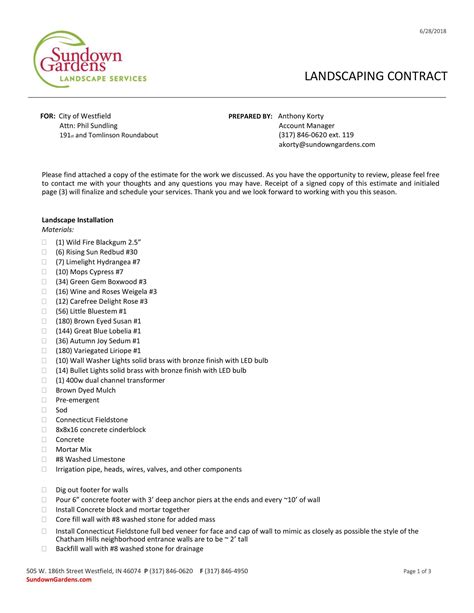Commercial Landscaping Contracts: The Key to Business Growth
Commercial landscaping is a lucrative business, but success hinges on more than just a green thumb. A well-crafted commercial landscaping contract is the bedrock of any thriving operation. It protects your business, clarifies expectations with clients, and ultimately fuels growth. This comprehensive guide delves into the crucial elements of a robust commercial landscaping contract and how it contributes to long-term business success.
What Makes a Commercial Landscaping Contract Essential?
Before diving into the specifics, let's understand why a detailed contract is paramount for your commercial landscaping business. It's more than just a formality; it's a legal document safeguarding you from potential disputes, missed payments, and scope creep. A strong contract clearly outlines the services provided, payment terms, responsibilities, and liabilities, minimizing misunderstandings and fostering a professional relationship with your clients. This, in turn, leads to repeat business and positive word-of-mouth referrals, driving growth.
Key Components of a Solid Commercial Landscaping Contract
Several critical components must be included in any effective commercial landscaping contract. These components provide clarity and protection for both you and your client.
1. Identifying Parties Involved
Clearly identify both the landscaping company (your business) and the client (property owner or management company). Include full legal names, addresses, and contact information for each party. This seemingly simple step prevents ambiguity and establishes a clear framework for communication.
2. Detailed Scope of Work
This is arguably the most critical section. The scope of work should meticulously detail all services to be provided. This includes:
- Specific services: Lawn mowing, trimming, fertilization, weed control, planting, irrigation maintenance, snow removal (if applicable), etc.
- Frequency of service: Weekly, bi-weekly, monthly, or as otherwise specified.
- Areas to be serviced: Precisely define the areas covered by the contract, using measurements, property maps, or other visual aids if necessary.
- Materials used: Specify the types and brands of fertilizers, pesticides, and other materials used. This is vital for transparency and managing client expectations.
3. Payment Terms
Clearly outline payment schedules, methods of payment (check, credit card, etc.), and any applicable late payment fees. Be upfront about deposit requirements, and specify when payment is due for each service period or project milestone.
4. Contract Duration and Termination Clause
State the contract's duration, whether it's for a specific period (e.g., one year) or ongoing until terminated. Include a termination clause outlining the conditions under which either party can terminate the agreement, including required notice periods.
5. Liability and Insurance
This section is crucial for protecting your business. Specify your company's liability insurance coverage and ensure it meets the client's requirements. It also helps to clarify the responsibility for damages or injuries that may occur on the property.
6. Dispute Resolution
Include a process for resolving any disputes that may arise. This could involve mediation, arbitration, or litigation. Clearly outlining this process prevents costly and time-consuming legal battles.
7. Indemnification Clause
This section protects your business from liability for damages caused by the client's actions or negligence. It's essential to include language that covers this aspect.
Frequently Asked Questions (FAQs) about Commercial Landscaping Contracts
Here are answers to some common questions surrounding commercial landscaping contracts:
How much should I charge for commercial landscaping services?
Pricing varies considerably depending on location, scope of work, and market conditions. Research your local competitors and factor in your costs, desired profit margin, and the value you provide to your clients.
What happens if the client doesn't pay?
Your contract should clearly outline late payment fees and procedures for non-payment. If payment isn't received, consult legal counsel to explore options such as pursuing payment through small claims court or debt collection agencies.
Can I change the contract after it's signed?
Any changes to the contract should be made in writing and signed by both parties. Amendments should be clearly documented and attached to the original contract.
Conclusion: Contracts Fuel Growth
A meticulously crafted commercial landscaping contract is not just a legal document; it's a strategic tool for business growth. It provides clarity, protects your business from liabilities, fosters strong client relationships, and ultimately ensures a smoother, more profitable operation. By paying close attention to the details discussed above, you can establish a robust foundation for your commercial landscaping business and cultivate a thriving, successful enterprise. Remember to consult with legal counsel to ensure your contract is legally sound and tailored to your specific needs and circumstances.

